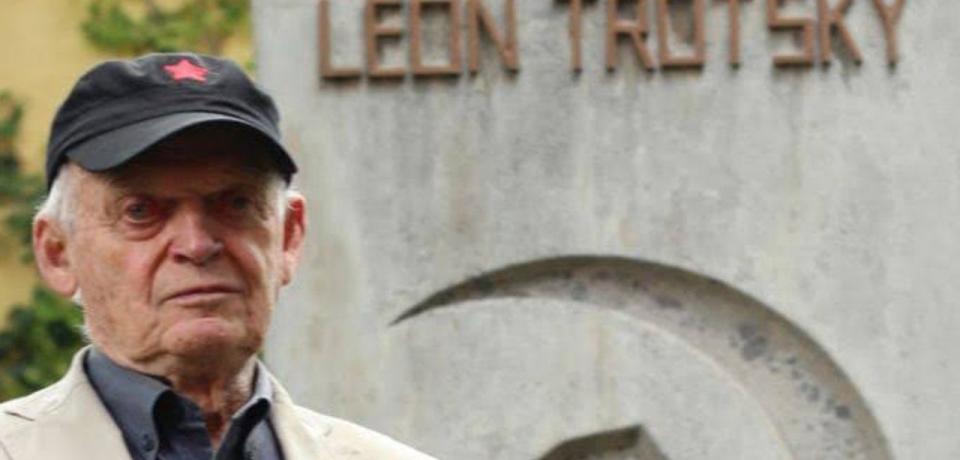
As we bid farewell to Don Esteban, who died on June 16 at the age of 97, we pledge not only to support the continuity of the work of the Leon Trotsky House Museum in Mexico, but also to continue collaborating with his life’s mission: to preserve and spread the political legacy of his revolutionary grandfather.
On Friday, June 16, Don Esteban Volkov, Leon Trotsky’s grandson, died in Mexico. He was the last living witness of the last years of his grandfather’s work and assassination, committed by the Stalinist agent Ramon Mercader on August 21, 1940, in the house where the family of the exiled Russian revolutionary lived in Coyoacán. The building was transformed by Don Esteban in 1990 into the Leon Trotsky House Museum.
It is a very important chapter in the history of the left in the 20th century that closes with his passing, because Don Esteban was more than a grandson. He was a conscious guardian of the legacy of struggle, of the theoretical production and of the political resistance of his relatives and compatriots of the Left Opposition of the Soviet Union. Hence the importance of his life, of his tireless voice in remembering Stalin’s purges and persecutions of an entire generation of pre and post-1917 revolutionaries; in the tireless work to preserve documents, objects, and family memories; in the struggle to refute the smear campaigns that Trotsky, even after his death, and the Trotskyists faced for decades.
Volkov was born Vsevolod Platonovich Volkov in Yalta, Ukraine, in 1926, the son of Zinaida Volkova, born Bronstein, Trotsky’s first daughter with his fellow revolutionary and first wife Aleksandra Sokolovskaya, (Trotsky and Alexandra had a second daughter, Nina). With the family nickname of Sieva, Don Esteban’s life was marked by the impacts those 1920s had on his childhood.
Esteban's father, Platon Ivanovich Volkov (1898-1936), was a member of the Left Opposition led by Trotsky, arrested twice under Stalin (1928 and 1935) and disappeared in a Gulag in 1936 during the period called the Great Purges. Zinaida, also an oppositionist militant, managed to leave the USSR to see her father in Prinkipo, Turkey, the site of Trotsky’s first exile. However, the Stalinist regime prevented her from returning to the USSR, where she had left her daughter. Zinaida committed suicide in January 1933 in Berlin just before Hitler came to power, leaving her son orphaned at age 7. After a brief period in a boarding school in Vienna, little Sieva was taken to Paris by Leon Sedov, one of the two children of Trotsky and his second wife Natalia Sedova, and also a leader of the current that would give rise to Trotskyism. After Sedov was murdered by the GPU (later KGB) in 1938, his grandfather’s friends finally managed to get Sieva to Mexico, where he became Esteban.
When he was 13, he witnessed an assassination attempt against his grandfather (by firearms) in May 1940 and, in August of that year, the murder of Trotsky when he had just come home from school. According to friends, family, and everyone who heard him talk about these events over the course of decades, Don Esteban was moved by the memories of those days every time he recounted them.
The Russian boy grew up in Mexico, studied chemical engineering, and is among those who manufactured the first birth control pills. He married and had three daughters. In 1988, he obtained a visa from the then Soviet Union to visit his then home country. He found his sister, tragically separated from her mother in the 1920s, by then a fatally ill woman who spoke Russian - a language Esteban had forgotten. The siblings needed an interpreter, an eventuality that Trotsky had feared when he urged the young Esteban to keep up his Russian.
Despite the tragedies, or precisely because of the wounds of childhood mixed with the lessons he drew from family life, Don Esteban was a tireless defender of the ideas of those who led the Russian Revolution of 1917, an enemy of capitalism and Stalinism. He demonstrated this by creating what is now the “Right of Asylum Institute – Leon Trotsky House Museum”, which he directed until he was over 90 years old. The Institute for the Right of Asylum and Public Liberties was created to help other political dissidents seeking asylum in Mexico as Trotsky had, it was consolidated with the museum in 1996.
There, in Coyoacán, Don Esteban gave hundreds of lectures. He was never politically affiliated, but with his work of preservation and defence of the family legacy, he collaborated with all the Trotskyist currents. In 1988 he participated in the 3000-strong commemoration of the 50th anniversary of the Fourth International organized by the Ligue Communiste Révolutionnaire, French section of the Fourth International.
According to the Museum's staff, he was the soul of that space. “Without his drive and character, the museum would have failed in its task, everything we are today as an institution we owe to him,” says the statement about Don Esteban's death. “His death will leave a deep void that will be very difficult to fill.”
To the family, friends from all over the world and the Museum staff, all the solidarity of the Fourth International and its militants. We know that Don Esteban will be irreplaceable in Coyoacán, but we believe that his work, and the legacy that he preserved and spread, are still very much alive: in the independent struggles of the exploited and oppressed all over the Earth against corporations and bourgeois governments; in the tireless battle to build political parties and organizations defending the political independence of the working class; in the democratic, fraternal, theoretical effort for the (re) construction of a socialist strategy, also ecological, anti-racist and feminist, for an humanity more than ever threatened - a strategy based on the self-organization and self-government of those from below.
Don Esteban and his grandfather will live on in our struggle.
Executive Bureau of the Fourth International, 22 June 2023